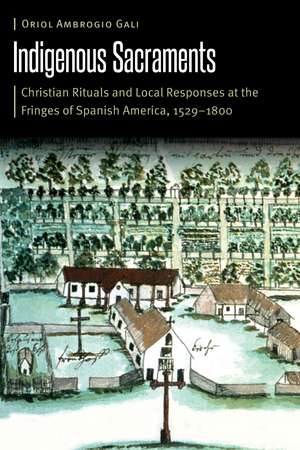Indigenous Sacraments: Christian Rituals and Local Responses at the Fringes of Spanish America, 1529–1800: Borderlands and Transcultural Studies
Autor Oriol Ambrogio Galien Limba Engleză Hardback – dec 2024
The disruptions triggered by such processes raised multiple local reactions, from initial curiosity and incomprehension to rejection, partial acceptance, and ritual imitation. Locals debated the newly introduced rituals and both violently rejected them and developed their own versions, becoming active participants in the sacraments’ diffusion.
Oriol Ambrogio Gali draws on a range of diverse sources to explore the changing attitudes toward the sacraments and to highlight the cultural and religious evolution of the Indigenous groups living at the fringes of Spanish America. By exploring local perceptions of the Christian sacraments, Ambrogio Gali shows that Indigenous peoples were far from static recipients of Christianity in the Americas.
Din seria Borderlands and Transcultural Studies
-
 Preț: 217.31 lei
Preț: 217.31 lei -
 Preț: 265.74 lei
Preț: 265.74 lei -
 Preț: 159.22 lei
Preț: 159.22 lei -
 Preț: 159.32 lei
Preț: 159.32 lei -
 Preț: 202.83 lei
Preț: 202.83 lei -
 Preț: 217.47 lei
Preț: 217.47 lei -
 Preț: 332.94 lei
Preț: 332.94 lei -
 Preț: 334.30 lei
Preț: 334.30 lei -
 Preț: 426.41 lei
Preț: 426.41 lei -
 Preț: 428.14 lei
Preț: 428.14 lei -
 Preț: 360.59 lei
Preț: 360.59 lei -
 Preț: 429.51 lei
Preț: 429.51 lei -
 Preț: 219.64 lei
Preț: 219.64 lei -
 Preț: 464.44 lei
Preț: 464.44 lei -
 Preț: 464.99 lei
Preț: 464.99 lei -
 Preț: 429.89 lei
Preț: 429.89 lei -
 Preț: 259.16 lei
Preț: 259.16 lei -
 Preț: 459.98 lei
Preț: 459.98 lei - 15%
 Preț: 452.68 lei
Preț: 452.68 lei -
 Preț: 300.32 lei
Preț: 300.32 lei -
 Preț: 512.19 lei
Preț: 512.19 lei -
 Preț: 214.80 lei
Preț: 214.80 lei -
 Preț: 508.71 lei
Preț: 508.71 lei -
 Preț: 458.45 lei
Preț: 458.45 lei
Preț: 497.83 lei
Nou
Puncte Express: 747
Preț estimativ în valută:
95.26€ • 101.87$ • 79.43£
95.26€ • 101.87$ • 79.43£
Carte tipărită la comandă
Livrare economică 18 aprilie-02 mai
Preluare comenzi: 021 569.72.76
Specificații
ISBN-13: 9781496235770
ISBN-10: 1496235770
Pagini: 330
Ilustrații: 5 maps, index
Dimensiuni: 152 x 229 x 15 mm
Greutate: 0.65 kg
Editura: Nebraska
Colecția University of Nebraska Press
Seria Borderlands and Transcultural Studies
Locul publicării:United States
ISBN-10: 1496235770
Pagini: 330
Ilustrații: 5 maps, index
Dimensiuni: 152 x 229 x 15 mm
Greutate: 0.65 kg
Editura: Nebraska
Colecția University of Nebraska Press
Seria Borderlands and Transcultural Studies
Locul publicării:United States
Notă biografică
Oriol Ambrogio Gali is a research fellow at the University of Nottingham.
Cuprins
List of Maps
Acknowledgments
Introduction
1. The Jesuits in Spanish America: An Overview (1566–1767)
2. Indigenous Peoples, Missionaries, and Soldiers at the Fringes of Spanish America (1529–1767)
3. Baptism, Healing Rituals, and Death
4. Confessing Indigenous Peoples
5. Marrying Indigenous Peoples
6. The Chalice, the Host, and the Indigenous Peoples
Epilogue
Notes
References
Index
Acknowledgments
Introduction
1. The Jesuits in Spanish America: An Overview (1566–1767)
2. Indigenous Peoples, Missionaries, and Soldiers at the Fringes of Spanish America (1529–1767)
3. Baptism, Healing Rituals, and Death
4. Confessing Indigenous Peoples
5. Marrying Indigenous Peoples
6. The Chalice, the Host, and the Indigenous Peoples
Epilogue
Notes
References
Index
Recenzii
“A major contribution to the history of the Christianization of Indigenous groups at the margins of Spain’s colonial American empire. Herein Oriol Ambrogio Gali comparatively studies the role of the Jesuit missions in three peripheral areas of colonization (northwestern Mexico, south central Chile, and the Gran Chaco), each with a plethora of Native ethnicities, distinct languages and cultures, and considerable resistance to religious change. . . . [An] amazing work of scholarship and research.”—Ramón A. Gutiérrez, author of New Mexico’s Moses: Reies López Tijerina and the Religious Origins of the Mexican American Civil Rights Movement
“Indigenous Sacraments reflects a deep education in church history and missionary history in the New World. Clearly, Ambrogio Gali knows the field inside and out and has immersed himself in the existing scholarship across the Spanish-, English-, German-, and Italian-speaking academic communities. The book is informed by countless well-known missionary chronicles, but also by less-familiar print sources and by substantial archival research.”—Sean F. McEnroe, author of A Troubled Marriage: Indigenous Elites of the Colonial Americas
Descriere
Indigenous Sacraments provides the first study of Indigenous perceptions of the Christian sacraments at the fringes of colonial Spanish America, with a specific focus on the missions established by the Jesuits in northwestern Mexico, central southern Chile, and the Gran Chaco.
